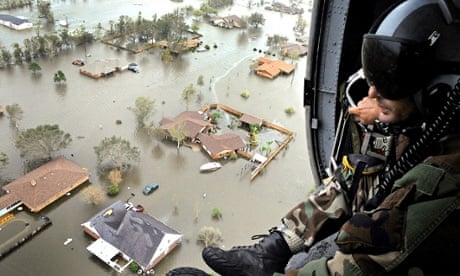By Mark Drajem and Mark Chediak
Beaver County Peace Links via Bloomberg News
Oct 14, 2014 - Natural disasters from climate change will intensify global instability, disease, poverty and conflict, according to the U.S. Defense Department.
Global warming will worsen many of the challenges the U.S. military already is grappling with, the department said in a report yesterday.
“We refer to climate change as a ‘threat multiplier’ because it has the potential to exacerbate many of the challenges we are dealing with today -– from infectious disease to terrorism,” Secretary of Defense Chuck Hagel said in a blog post. “While scientists are converging toward consensus on future climate projections, uncertainty remains. But this cannot be an excuse for delaying action.”
The report underscores the seriousness of the risks as seen by the military, which handled flooding and tsunami relief efforts in Asia in recent years and is now responsible for setting up treatments centers for Ebola victims in West Africa.
“The issue of climate change as a national security risk is something that has been of concern and people have been discussing it for a number of years,” said Charles Kolstad, a professor of economics and senior fellow at Stanford University in California, in a telephone interview.
He said climate change damage such as water scarcity are “much more likely to exacerbate regional conflicts, which can be real risks to the United States.”
Planning Process
The report says that climate change will affect the military in four main ways: through rising temperatures, changing precipitation patterns, increasing intense storms and rising sea levels.
It lays out a long-term process for the armed forces to try to incorporate those changes into their planning for future threats.
Climate change will likely “lead to food and water shortages, pandemic disease, disputes over refugees and resources, and destruction by natural disasters in regions across the globe,” Hagel wrote in the report.
The Pentagon report said that as a result there will be increased demand for the National Guard to deal with domestic natural disasters, as well as prompt changes to the rebalancing of forces in Asia.
“Politics or ideology must not get in the way of sound planning,” Hagel said in the introduction to the 20-page report. “Our armed forces must prepare for a future with a wide spectrum of possible threats.”
To contact the reporters on this story: Mark Drajem in Washington at mdrajem@bloomberg.net; Mark Chediak in San Francisco at mchediak@bloomberg.net


No comments:
Post a Comment